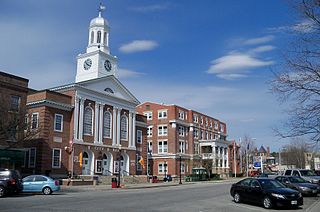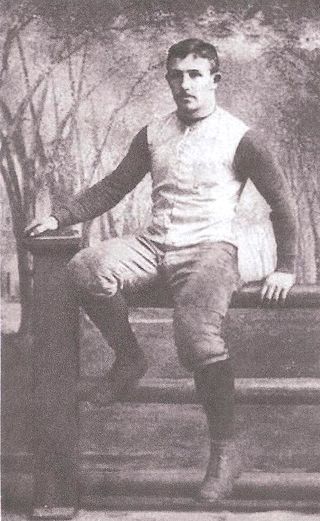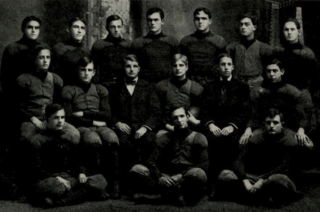Lane Dwinell | |
|---|---|
 | |
| 69th Governor of New Hampshire | |
| In office January 6, 1955 –January 1, 1959 |
Lane Dwinell | |
|---|---|
 | |
| 69th Governor of New Hampshire | |
| In office January 6, 1955 –January 1, 1959 |

Interstate 89 (I-89) is an Interstate Highway in the New England region of the United States traveling from Bow, New Hampshire, to the Canada–United States border between Highgate Springs, Vermont, and Saint-Armand, Quebec. As with all odd-numbered primary Interstates, I-89 is signed as a north–south highway. However, it follows a primarily northwest-to-southeast path. The route forms a major part of the main connection between the cities of Montreal and Boston. In Quebec, the route continues as Route 133. The eventual completion of Autoroute 35 will lead to a nonstop limited-access highway route between Boston and Montreal, following I-93 south from I-89's terminus. The largest cities directly served by I-89 are Concord, the state capital of New Hampshire; Montpelier, the state capital of Vermont; and Burlington, Vermont. I-89 is one of three main Interstate highways whose route is located entirely within New England, along with I-91 and I-93.

Lebanon is the only city in Grafton County, New Hampshire, United States. The population was 14,282 at the 2020 census, up from 13,151 at the 2010 census. Lebanon is in western New Hampshire, south of Hanover, near the Connecticut River. It is the home to Dartmouth–Hitchcock Medical Center and Dartmouth College's Geisel School of Medicine, together comprising the largest medical facility between Boston, Massachusetts, and Burlington, Vermont.

Piermont is a town in Grafton County, New Hampshire, United States. The population was 769 at the 2020 census. It is home to Camp Walt Whitman and Kingswood Camp for Boys.

The Republic of Indian Stream or the Indian Stream Republic was an unrecognized republic in North America, along the section of the border that divides the current Canadian province of Quebec from the U.S. state of New Hampshire. It existed from July 9, 1832, to August 5, 1835. Described as "Indian Stream Territory, so-called" by the United States census-taker in 1830, the area was named for Indian Stream, a small watercourse. It had an organized elected government and constitution and served about three hundred citizens.

U.S. Route 4 (US 4) is a 253-mile-long (407 km) United States Numbered Highway that runs from East Greenbush, New York, in the west to Portsmouth, New Hampshire, in the east, traversing Vermont.
Amos Fortune was an African-American citizen of Jaffrey, New Hampshire, in the 18th century. Fortune was born in Africa and brought to America as an enslaved person. He was given the name "Amos Fortune" by his masters. He purchased his freedom at the age of 60 and moved to Jaffrey to start a leather tannery business. Documents now archived at the Jaffrey Public Library testify to his literacy, community position, and financial success.
Justin Dwinell was an American lawyer and politician from New York.
David Hough was an American politician, a farmer, and a United States Representative from New Hampshire.

Charles Otis Gill was an American Congregationalist clergyman and college football player and coach. With Gifford Pinchot he co-authored two influential books on the state of rural churches in the United States.

U.S. Route 4 in New Hampshire runs for 106.834 miles (171.933 km) across the central and southern part of the state, stretching from Lebanon on the Connecticut River border with Vermont southeast to Portsmouth on the eastern coast.
Stephen Morse Wheeler was a justice of the New Hampshire Supreme Court from 1957 to 1967.
Dwinell is a surname. Notable people with the surname include:

The 1966 United States Senate election in New Hampshire took place on November 8, 1966. Incumbent Democratic Senator Thomas J. McIntyre won re-election to a full term, having first been elected in a special election in 1962. This was the first time that a Democrat was reelected to the Senate from New Hampshire.

Massachusetts House of Representatives' 8th Worcester district in the United States is one of 160 legislative districts included in the lower house of the Massachusetts General Court. It covers parts of Norfolk County and Worcester County. Republican Mike Soter of Bellingham has represented the district since 2019.

Massachusetts House of Representatives' 7th Worcester district in the United States is one of 160 legislative districts included in the lower house of the Massachusetts General Court. It covers part of Worcester County. Republican Paul Frost of Auburn has represented the district since 1997.

The 1906 New Hampshire football team was an American football team that represented New Hampshire College of Agriculture and the Mechanic Arts during the 1906 college football season—the school became the University of New Hampshire in 1923. Under first-year head coach Edward Herr, the team finished with a record of 2–5–1.

The 1956 New Hampshire gubernatorial election was held on November 6, 1956. Incumbent Republican Lane Dwinell defeated Democratic nominee John Shaw with 54.73% of the vote.

The 1954 New Hampshire gubernatorial election was held on November 2, 1954. Republican nominee Lane Dwinell defeated Democratic nominee John Shaw with 55.12% of the vote.
Senator Dwinell may refer to:
George E. Sykes is an American politician serving as a member of the New Hampshire House of Representatives from the Grafton-13 district since December 5, 2012, and a member of the Lebanon City Council from Ward 2 since 2019. Sykes is a member of the Democratic Party.